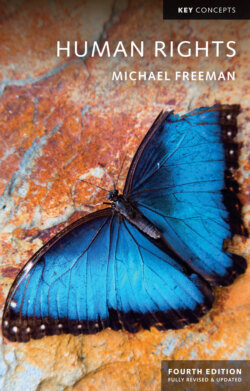Читать книгу Human Rights - Michael Freeman - Страница 5
Preface to the Fourth Edition
Оглавление‘These are the times that try men’s souls.’
Thomas Paine, The American Crisis, 1776
This is the fourth edition of a book about the concept of human rights in the social sciences. The third edition was completed in November 2016. In that month Donald Trump was elected President of the USA. Much has happened in society and the social sciences since then. President Trump has come and gone; President Biden has arrived. The UK has left the European Union. China’s rise has continued. Authoritarian populism has taken command in many countries, including Russia, India, Brazil, Hungary, Poland and the Philippines. Violent conflicts persist in Syria, Yemen, Myanmar and Mozambique. Climate change threatens disaster. New technologies threaten democracy. A pandemic is killing millions. Racial tensions are unresolved. These are hard times for human rights.
The concept of human rights has a complex relationship with the social sciences. The contemporary concept derives from the United Nations Charter of 1945 and the UN Universal Declaration of Human Rights of 1948, which gave rise to a vast body of international and national human-rights law. These were indebted to the concepts of natural rights and the Rights of Man proclaimed in the American and French revolutions of the eighteenth century. The social sciences emerged in the nineteenth century in reaction against those concepts, which they rejected as anti-social and unscientific. For decades after the UN revived the concept of human rights, the social sciences took little notice. After the rise of the human-rights movement in the 1970s, and the challenges to authoritarian rule in eastern Europe, Latin America, South Africa and elsewhere, the social science of human rights began to wake up. The early social-science studies focused on US foreign policy and the impact of international human-rights law, and generally reached sceptical conclusions about both. Later studies reached more nuanced conclusions. Recently renewed scepticism about human rights has appeared with titles such as The Twilight of Human Rights Law (Posner 2014a) and The Endtimes of Human Rights (Hopgood 2013). A new generation of human-rights historians has challenged what they call the ‘textbook’ history of human rights, which they consider simplistic and triumphalist, and questioned long-term, ‘deep’ histories for underplaying the changing nature of rights-concepts.
This book is committed to the following propositions: 1) because the concept of human rights and the social sciences have different histories and rest on different philosophical assumptions, the relationship between them must be understood, in part, historically and philosophically; 2) because the human-rights movement and social science rest on deep assumptions that are problematic and rarely acknowledged, a ‘deep’ history that excavates these assumptions is necessary to clarify and evaluate them; 3) social science is necessary to evaluate the concept of human rights in theory and practice; 4) evaluating both human rights and social science requires an understanding of both their value and their limits.
This new edition covers the ‘real world’ of human rights up to the early days of the Biden presidency and the Islamist massacres in Mozambique. It takes account of the Black Lives Matter movement and the call to ‘decolonize’ the curriculum with a new emphasis on the complex historical relationship between human-rights liberalism, racism and colonialism. It responds to the claim that the concept of human rights is inadequate to deal, in theory or in practice, with issues of social justice in general, and those of the global economy and neoliberal ideology in particular. It evaluates the current state of the international human-rights movement and the human-rights work of the United Nations. It locates the current state of human rights in contemporary concerns about a supposed crisis of liberal democracy and clarifies the misunderstood relationship of human rights to liberalism. It analyses the challenges for human rights of the environmental crisis, pandemics and new technologies. Finally, it assesses whether, faced with persistent violent conflict and gross human-rights violations in many parts of the world, social science exposes the concept of human rights as an illusory ideal or whether it gives us ‘evidence for hope’ (Sikkink 2017).
Michael Freeman
May 2021
